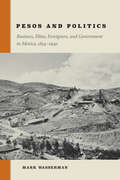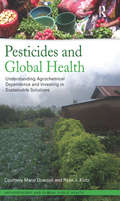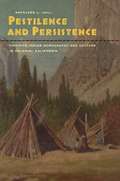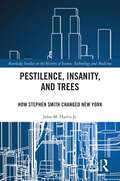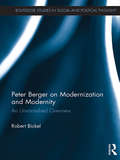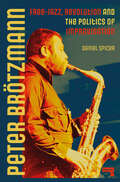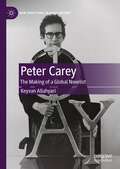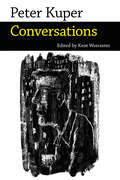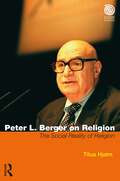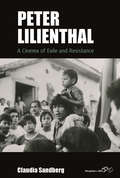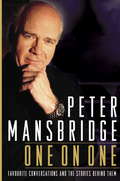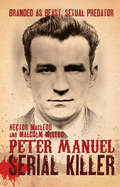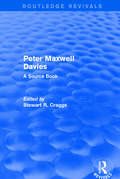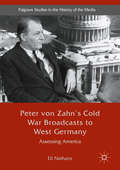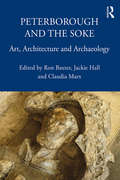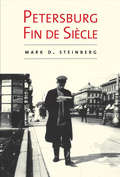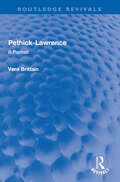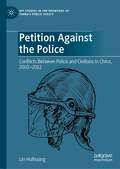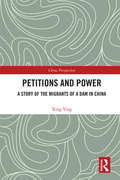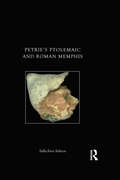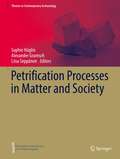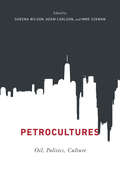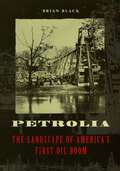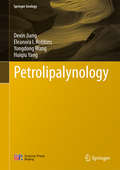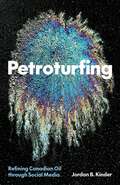- Table View
- List View
Pesos and Politics: Business, Elites, Foreigners, and Government in Mexico, 1854-1940
by Mark WassermanThe relationship between business and politics is crucial to understanding Mexican history, and Pesos and Politics explores this relationship from the mid-nineteenth century dictatorship of Porfirio Diaz through the Mexican Revolution (1876–1940). Historian Mark Wasserman argues that throughout this era, over the course of successive regimes, there was an evolving enterprise system that had to balance the interests of the Mexican national elite, state and local governments, large foreign corporations, and individual foreign entrepreneurs. During and after the Revolution these groups were joined by organized labor and organized peasants. Contrary to past assessments, Wasserman argues that no one of these groups was ever powerful enough to dominate another. Because Mexican governments and elites committed themselves to economic models that relied on foreign investment and technology, they had to reach a balance that simultaneously attracted foreign entrepreneurs, but did not allow them to become too powerful or too privileged. Concentrating on the three most important sectors of the Mexican economy: mining, agriculture, and railroads, and employing a series of case studies of the careers of prominent Mexican business people and the operations of large U.S.-owned ranching and mining companies, Wasserman effectively demonstrates that Mexicans in fact controlled their economy from the 1880s through 1940; foreigners did not exploit the country; and, Mexicans established, sometimes shakily, sometimes unplanned, a system of relations between foreigners, elite and government (and later unions and peasant organizations) that maintained checks and balances on all parties.
Pesticides and Global Health: Understanding Agrochemical Dependence and Investing in Sustainable Solutions (Anthropology and Global Public Health #1)
by Courtney Marie Dowdall Ryan J KlotzThis concise, accessible introduction to understanding agricultural chemicals and public health combines a broad synthesis on a global scale with rich ethnographic narratives on a human scale. Drawing on epidemiology, policy analysis, and social science research on the global commodity chain, the authors describe the system of global agrochemical dependence that constitutes a major threat to human health. Then they draw readers into the lush mountainsides of highland Guatemala, telling personal stories of farmers, their experiences with public health programs, their struggles against agrichemical dependence, and their innovations in sustainable agriculture. Finally, they show how this kind of qualitative, multi-level analysis holds practical lessons for public health. This engaging, brief text is an ideal supplement for courses in global health, introducing students to key concepts with broad coverage and engrossing ethnographic detail.
Pestilence and Persistence: Yosemite Indian Demography and Culture in Colonial California
by Kathleen L. HullThis innovative examination of the Yosemite Indian experience in California poses broad challenges to our understanding of the complex, destructive encounters that took place between colonists and native peoples across North America.
Pestilence, Insanity, and Trees: How Stephen Smith Changed New York (Routledge Studies in the History of Science, Technology and Medicine)
by John M. Harris Jr.This is the first full-length biography of New York surgeon and social activist Stephen Smith (1823–1922), who was appointed to fifty years of public service by three mayors, seven governors, and two U.S. presidents. The book presents the complex life of Stephen Smith, a consistent figure in the history of public health, mental health, housing reform in New York, and even urban reforestation. Utilizing Smith’s writings, public records, and recently discovered personal correspondence, this research shows how Smith succeeded where others failed. It also acknowledges that Smith was unsuccessful in convincing his fellow professionals to fight for a cabinet level public health department or to resist the rise of custodial care for the mentally impaired. Given Smith’s many accomplishments, the book asks us to consider if what stopped him stops us, highlighting the relevance of Smith’s story to contemporary debates. Pestilence, Insanity, and Trees is a readable and well-documented narrative and a resource for students and scholars, filling gaps in the history of American medicine, public health, mental health, and New York social reform.
Peter Berger on Modernization and Modernity: An Unvarnished Overview (Routledge Studies in Social and Political Thought)
by Robert BickelWith particular attention to his work on modernization and modernity as construed by a sociologist of knowledge, this book offers a sympathetic exposition and evaluation of Peter Berger’s work as one of the world’s most accomplished and influential sociologists. In the context of an examination of Berger’s ongoing work on the social construction of reality, styles of consciousness, the role of science-based technology, pluralism, and other pertinent topics, the author also considers Berger’s unique and thoughtful approach to research and theorizing. Berger’s method of ‘sociological tourism’, which departs sharply from the current emphasis in the social sciences on ever more complex and ostensibly rigorous statistical procedures, provides a refreshing move away from the increasingly esoteric and sometimes alienating methodological self-consciousness that characterizes contemporary sociology. With this distinctive approach, this book will appeal to scholars and students of sociology who share Berger’s interest. The importance of modernization and modernity on a world scale is undeniable, and a deeper understanding of their nature and consequences, will also benefit members of the intelligent laity who are not sociological specialists but are open to new ideas that are clearly explained.
Peter Brötzmann: Free-Jazz, Revolution and the Politics of Improvisation
by Daniel SpicerExplores the heroic life and revolutionary music of the pioneering German saxophonist, and the radical social and political convictions that informed them.Peter Brötzmann is the first ever, full-length, English-language biography of one of the most fascinating and inspiring personalities in the history of Western improvised music – and one of the key artistic figures to emerge from the socio-cultural tumult of the 1960s.Drawing on extensive interviews with Brötzmann and key associates, it traces the German saxophonist&’s crucial role as a pioneer of European free jazz, his restless travels and collaborations and his eventual superstardom, examining the life and work of a fiercely uncompromising artist with a reputation for gruff intensity and total commitment.Digging deep into the history and aesthetics of free jazz in Europe and beyond, it provides detailed analysis of music by Brötzmann and other major figures, while positioning Brötzmann&’s work – and the wider free jazz milieu – in the context of the revolutionary left-wing, humanist and utopian ideals that inspired and underpinned it.Both intimate and wide-ranging, it tells the story of a man and a music that changed the world.
Peter Carey: The Making of a Global Novelist (New Directions in Book History)
by Keyvan AllahyariPeter Carey: The Making of a Global Novelist recounts Peter Carey’s literary career from his emergence in the Australian literary scene as a contributor to local literary magazines to when he published his fiction exclusively with large conglomerate publishers. As Australia’s most decorated author for a period nearing half a century, Carey’s career gives unparalleled insights into the global contemporary publishing and the making of global literary prestige from the periphery, and significant cultural currency for Australian literature and culture worldwide. Carey’s fiction is not only a product of the global dynamic in literary publishing of the last quarter of the twentieth century, but also it holds something of its productive tension for Australian writing and writers. Allahyari retraces the fraught synthesis of an individual literary proclivity with a growing commercial cultural appetite: the coincidence of Carey’s career with the conglomeration of global publishing pushed further towards anti-elitist, popular aesthetics.
Peter Kuper: Conversations (Conversations with Comic Artists Series)
by Kent WorcesterPeter Kuper (b. 1958) is one of the country’s leading cartoonists. His artwork has graced the pages and covers of numerous newspapers and magazines, including Time, the New Yorker, Mother Jones, and the New York Times. He is a longtime contributor to Mad magazine, where he has been writing and drawing Spy vs. Spy for two decades, and the cofounder and coeditor of World War 3 Illustrated, the cutting-edge magazine devoted to political graphic art.Most of the interviews collected here are either previously unpublished or long out of print. They address such varied topics as world travels, teaching at Harvard, Hollywood deal-making, climate change, Spy vs. Spy, New York City in the 1970s and 1980s, and World War 3 Illustrated. Among the works examined are his books The System, Sticks and Stones, Stop Forgetting to Remember, Diario de Oaxaca, and adaptations of Franz Kafka’s The Metamorphosis and Upton Sinclair’s The Jungle. Kuper also discusses his graphic novel Ruins, which received the Eisner Award for Best New Graphic Novel in 2016.Along with two dozen images, this volume features ten lively, informative interviews as well as a quartet of revealing conversations, conducted in collaboration with Kuper’s fellow artist Seth Tobocman, with underground comix legends Robert Crumb and Vaughn Bodé, Mad magazine publisher William Gaines, and Jack Kirby.
Peter L. Berger on Religion: The Social Reality of Religion (Key Thinkers in the Study of Religion)
by Titus HjelmPeter L. Berger on Religion provides an overview and critical assessment of the work of one of the most influential sociologists of the 20th century.Situating Berger’s writings on religion and secularisation in the broader framework of social constructionism, the book argues that neither he nor the research influenced by him consistently followed the constructionist paradigm. This assessment is informed by a close examination of The Sacred Canopy (1967), in particular. The volume also offers a Berger‑inspired constructionist framework for the study of religion.This book is an excellent resource for students and researchers interested in the intersection of religion and social theory.
Peter Lilienthal: A Cinema of Exile and Resistance (Film Europa #25)
by Claudia SandbergBest known for his 1979 film David, Peter Lilienthal was an unusual figure within postwar filmmaking circles. A child refugee from Nazi Germany who grew up in Uruguay, he was uniquely situated at the crossroads of German, Jewish, and Latin American cultures: while his work emerged from West German auteur filmmaking, his films bore the unmistakable imprints of Jewish thought and the militant character of New Latin American cinema. Peter Lilienthal is the first comprehensive study of Lilienthal’s life and career, highlighting the distinctively cross-cultural and transnational dimensions of his oeuvre, and exploring his role as an early exemplar of a more vibrant, inclusive European film culture.
Peter Mansbridge One on One
by Peter MansbridgeFrom one of Canada's most respected and recognizable journalists comes a collection of the best interviews with the leading thinkers and cultural icons of our time, from the country's most trusted interview show.An extraordinary selection from Newsworld's Mansbridge One on One, including politicians, journalists, arts and sports figures and newsmakers behind the biggest issues of the past decade.Canadians have long relied on award-winning anchor and journalist Peter Mansbridge to inform and enlighten us, whether at the helm of The National or on Mansbridge One on One, his weekly interview show. In this, his first book, he collects the most illuminating and timely interviews from the past ten years, book-ending each with his behind-the-scenes recollections and anecdotes. Mansbridge acts as our guide as we get the inside story from prominent figures from all walks of life, including world leaders, music legends and sports heroes.Among the more than 40 interviewees included in the book are:Bill ClintonSidney CrosbyBill GatesDiana KrallBenjamin NetanyahuBarack ObamaShimon PeresDesmond TutuBrian WilsonFrom the Hardcover edition.
Peter Manuel, Serial Killer
by Hector MacLeod Malcolm McLeodPeter Manuel was an icy-eyed psychopath and sexual predator, a petty thief and a relentless liar given to violent and uncontrollable rages. His unprecedented crimes presented the Scottish police and public with a new sort of criminal: the ruthless serial killer. Manuel was hanged at the age of thirty-one and convicted of seven murders, but suspected of many more. He slew many of his victims as they lay sleeping in bed, while others were picked up in lonely places and strangled or savagely beaten to death. Right up to his final arrest, he played a taunting game with the police, mocking their bungling attempts to trap him and continuing to kill with impunity - that is until he was trapped by his own vanity and arrogance.This definitive definitive biography recounts Manuel's chilling story from his birth in the USA to the moment the hangman's rope snapped his spine in Glasgow's notorious Barlinnie Prison.
Peter Maxwell Davies: A Source Book
by Stewart R. CraggsThis title was first published in 2002. Sir Peter Maxwell Davies is one of Britain's most distinguished composers. This source book documents as much of the material on his music as is available to 2001. As Richard McGregor points out in his foreword to the volume, Stewart Craggs has made valuable advances in sorting out the origins of many unknown works and gleaning details of many private compositions. The book also supplies details of those unknown works which haven't appeared in any previous catalogues, including broadcasts of early works from the BBC Archives. With information given on first performances, manuscript locations and recordings, in addition to details of composition dates, authors/librettists, durations, commissions and dedications amongst much else, this book is a key reference source for all those interested in Peter Maxwell Davies and his music.
Peter von Zahn's Cold War Broadcasts to West Germany
by Eli NathansThis book examines the pioneering radio broadcasts and television documentaries about the United States made in the 1950s by the influential West German journalist Peter von Zahn. Part intellectual biography, part analysis of significant debates in West Germany, part study of an intensive encounter with the United States, the book helps explain the transformation of postwar West Germany. As a soldier in the Wehrmacht in World War II, Zahn held the militantly elitist views typical of young men in Germany's educated middle class. He reconsidered these positions in his postwar broadcasts. At the same time he coldly assessed the capacity of the United States to win the Cold War. His broadcasts examined McCarthyism, the African-American civil rights movement, and numerous aspects of American culture and politics. Zahn's broadcasts were one important voice in West German debates about the defects and virtues of modern democratic societies and especially of the United States, debates whose intensity reflected recent German experiences with the failure of the Weimar Republic and with Nazism. Zahn's analyses of the United States remain startlingly relevant today.
Peterborough and the Soke: Art, Architecture and Archaeology (The British Archaeological Association Conference Transactions)
by Ron Baxter Jackie Hall Claudia MarxThe British Archaeological Association Conference held at Peterborough in 2015 provided a welcome opportunity for a new analysis of the cathedral’s architecture, sculpture and artistic production, and a reassessment of the relationship between the former abbey, the city and its institutions, and the Soke over which it held sway. This ambitious volume casts new light on the Roman occupation of the Nene valley, and the rich Anglo-Saxon sculptural and manuscript context that preceded the construction of the present cathedral, as well as exploring the vital Romanesque tradition of the Soke and the essential contribution of the Barnack quarries. But inevitably the most exciting new disclosures concern the church: its high-quality building campaigns during the 12th to 16th centuries, its abbots’ tombs and the reconstruction of the lost 14th-century High Altar screen from descriptions and loose fragments. Peterborough has attracted the attention of antiquarian scholars since its sacking by Cromwell’s men during the Civil War, and as its secrets are gradually revealed it continues to stimulate the historical imagination.
Petersburg Fin de Siècle
by Mark D. SteinbergThe final decade of the old order in imperial Russia was a time of both crisis and possibility, an uncertain time that inspired an often desperate search for meaning. This book explores how journalists and other writers in St. Petersburg described and interpreted the troubled years between the Russian revolutions of 1905 and 1917. Mark Steinberg, distinguished historian of Russia in the late nineteenth and early twentieth centuries, examines the work of writers of all kinds, from anonymous journalists to well-known public intellectuals, from secular liberals to religious conservatives. Though diverse in their perspectives, these urban writers were remarkably consistent in the worries they expressed. They grappled with the impact of technological and material progress on the one hand, and with an ever-deepening anxiety and pessimism on the other. Steinberg reveals a new, darker perspective on the history of St. Petersburg on the eve of revolution and presents a fresh view of Russia's experience of modernity.
Pethick-Lawrence: A Portrait (Routledge Revivals)
by Vera BrittainFirst published in 1963, Pethick-Lawrence is a detailed biography of the life and career of Frederick William Pethick-Lawrence. Written by Vera Brittain, a close friend of Pethick-Lawrence during the last twenty-five years of his life, the book is a thorough and affectionate record of his personality and achievements. It makes extensive use of Pethick-Lawrence’s well-organised personal papers to provide a detailed account of his activities, both public and private, and traces his life from birth, through his schooling, his meeting with Emmeline and involvement with the suffrage movement, his political career and role as Secretary of State for India, his marriage to Helen, and his death in 1961. Pethick-Lawrence is a personal view into the life of Frederick William Pethick-Lawrence, and twentieth-century society and politics.
Petition Against the Police: Conflicts Between Police and Civilians in China, 2003–2012 (IPP Studies in the Frontiers of China’s Public Policy)
by Lin HuihuangThis book explores the petition(信访), a political system with Chinese characteristics. It is an important form of political participation for people at the bottom and an effective means of supervising officials at the grassroots level for the higher-level government. Through a half-year fieldwork of the Public Security Bureau, the author found that the operational logic of the petition seems to be different from the past, and it is the change of petition logic that leads to the dilemma that “the cost of petitioning is reduced but the road of rights safeguarding is narrowed,” or in other words, it's easier to make a petition but harder to succeed for those who are truly wronged. This book based on the grassroots of China's legal system is worth reading for those that are interested in studying police and petition as well as political sociology and organizational sociology.
Petitions and Power: A Story of the Migrants of a Dam in China (China Perspectives)
by Xing YingUsing the way of storytelling, this book examines the petitions of the migrants of a dam in China. With the intensive and thorough analysis of the unique logic behind the petitions, it explores the complex relationship between Chinese peasants and governments, where people may find the key to the mysteries of Chinese society. As the first academic monograph which systematically studies petition, the peculiar Chinese social phenomenon, this book describes the collective action of the rural migrants who had fallen into poverty due to the construction of a dam in China’s Three Gorges area. By investigating the ups and downs of the petitions, it reveals the operating mechanism of Chinese counties, the conflicts between the officials and the masses, as well as Chinese political culture, especially the subtle process of the contest of powers. It observes that the peasants’ pursuit of justice not only temporarily maintains the balance of interests, but also makes the legitimacy of the party-state been reproduced. With substantial first-hand materials and empirical analyses, this book will be a valuable reference for scholars and students to study Chinese politics and society.
Petrie's Ptolemaic and Roman Memphis
by Sally-Ann AshtonMemphis was one of the great melting pots of Mediterranean and African culture during the reigns of the heirs of Alexander and under the Roman Empire, a vibrant and complex community well after the end of the age of its ancient Pharaonic founders. For too long, its importance during this critical period has been wrongly eclipsed by the younger city of Alexandria. This book challenges such assumptions by taking a closer look at Memphis through the lens of the rich material excavated there by Flinders Petrie over a century ago, and exhibited in University College London‘s Petrie Museum. These finds bring alive the diversity of the city‘s inhabitants and raise questions, still relevant today, about the representations and realities of ethnic groups. This book presents the excavation background to the finds, their manufacturing processes and their cultural implications. It is accompanied by a CD ROM that illustrates this informative and neglected material.
Petrification Processes in Matter and Society (Themes in Contemporary Archaeology)
by Sophie Hüglin Alexander Gramsch Liisa SeppänenPetrification is a process, but it also can be understood as a concept. This volume takes the first steps to manifest, materialize or “petrify” the concept of “petrification” and turn it into a tool for analyzing material and social processes. The wide array of approaches to petrification as a process assembled here is more of a collection of possibilities than an attempt to establish a firm, law-generating theory. Divided into three parts, this volume’s twenty-plus authors explore petrification both as a theoretical concept and as a contextualized material and social process across geological, prehistoric and historic periods. Topics connecting the various papers are properties of materials, preferences and choices of actors, the temporality of matter, being and becoming, the relationality between actors, matter, things and space (landscape, urban space, built space), and perceptions of the following generations dealing with the petrified matter, practices, and social relations. Contributors to this volume study specifically whether particular processes of petrification are confined to the material world or can be seen as mirroring, following, triggering, or contradicting changes in social life and general world views. Each of the authors explores – for a period or a specific feature – practices and changes that led to increased conformity and regularity. Some authors additionally focus on the methods and scrutinize them and their applications for their potential to create objects of investigation: things, people, periods, in order to raise awareness for these or to shape or “invent” categories. This volume is of interest to archaeologists, geologists, architectural historians, conservationists, and historians.
Petrocultures: Oil, Politics, Culture
by Imre Szeman Adam Carlson Sheena WilsonContemporary life is founded on oil – a cheap, accessible, and rich source of energy that has shaped cities and manufacturing economies at the same time that it has increased mobility, global trade, and environmental devastation. Despite oil’s essential role, full recognition of its social and cultural significance has only become a prominent feature of everyday debate and discussion in the early twenty-first century. Presenting a multifaceted analysis of the cultural, social, and political claims and assumptions that guide how we think and talk about oil, Petrocultures maps the complex and often contradictory ways in which oil has influenced the public’s imagination around the world. This collection of essays shows that oil’s vast network of social and historical narratives and the processes that enable its extraction are what characterize its importance, and that its circulation through this immense web of relations forms worldwide experiences and expectations. Contributors’ essays investigate the discourses surrounding oil in contemporary culture while advancing and configuring new ways to discuss the cultural ecosystem that it has created. A window into the social role of oil, Petrocultures also contemplates what it would mean if human life were no longer deeply shaped by the consumption of fossil fuels.
Petrolia: The Landscape of America's First Oil Boom (Creating the North American Landscape)
by Brian BlackThis award-winning history provides a fascinating look at the Civil War era oil boom in western Pennsylvania and its devastating impact on the region. In Petrolia, Brian Black offers a geographical and social history of a region that was not only the site of America’s first oil boom but was also the world’s largest oil producer between 1859 and 1873. Against the background of the growing demand for petroleum throughout and immediately following the Civil War, Black describes Oil Creek Valley’s descent into environmental hell. Known as “Petrolia,” the region of northwestern Pennsylvania charged the popular imagination with its nearly overnight transition from agriculture to industry. But so unrestrained were these early efforts at oil drilling, Black writes, that “the landscape came to be viewed only as an instrument out of which one could extract crude.” In a very short time, Petrolia was a ruined place—environmentally, economically, and to some extent even culturally. Black gives historical detail and analysis to account for this transformation.Winner of the Paul H. Giddens Prize in Oil History from Oil Heritage Region, Inc.
Petrolipalynology
by Dexin Jiang Eleanora I. Robbins Yongdong Wang Huiqiu YangThis book addresses the principles and methods for determining petroleum source rocks based on fossil spores and pollen. Studying petroliferous basins in China, we discovered that there are often as many as three different sources of the microfossils: the source rocks, the rocks along the pathway, and the reservoir rocks. Therefore, fossil spores, pollen and algae from inland and coastal shelf petroliferous basins are analyzed and illustrated to show this complex process. Furthermore, the organic origin theory of oil is proven and environmental characteristics for hydrocarbon source-rock formation are discussed. Along with the geochronical and geographic distribution of non-marine petroleum source rocks in China, the mechanisms of petroleum migration following the pathways to the reservoirs are investigated. It will be a valuable reference work as well as a textbook for a wider research areas ranging from stratigraphy, palynology, palaeontology and petroleum geology.
Petroturfing: Refining Canadian Oil through Social Media
by Jordan B. KinderHow social media has become a critical tool for advancing the interests of the Canadian oil industry Petroturfing presents an incisive look into how Canada&’s pro-oil movement has leveraged social media to rebrand the extractive economy as a positive force. Adapting its title from the concept of astroturfing, which refers to the practice of disguising political and corporate media campaigns as grassroots movements, the book exposes the consequences of this mutually informed relationship between social media and environmental politics. Since the early 2010s, an increasingly influential network of pro-oil groups, organizations, and campaigns has harnessed social media strategies originally developed by independent environmental organizations in order to undermine resistance to the fossil fuel industry. Situating these actions within the broader oil culture wars that have developed as an outgrowth of contemporary right-wing media, Petroturfing details how this coalition of groups is working to reform the public view of oil extraction as something socially, economically, and ecologically beneficial. By uncovering these concerted efforts to influence the &“energy consciousness,&” Jordan B. Kinder reveals the deep divide between Canada&’s environmentally progressive reputation and the economic interests of its layers of government and private companies operating within its borders. Drawing attention to the structures underlying online political expression, Petroturfing highlights the limitations of social media networks in the work of promoting environmental justice and contributing to a more equitable future.
